#also the mindset that is skill is only valuable if it can be used professionally is incredibly damaging and degrading
Explore tagged Tumblr posts
Text
what’s really cool and awesome and normal is how in spite of artists’ best efforts to offer art to the general public, to people who don’t have art education and aren’t immersed in a particular sect of any given genre or culture, putting their work in low-cost or free galleries or airports or the sides of buildings or in parks or in malls or in outdoor shopping squares or in any public area where their projects can be viewed, people still reject the notion of art as a whole because they consider it entirely secondary to everything valuable in a person’s life. you can’t tell someone you’re an art major without seeing that inherent condescension or repulsion or confusion crossing someone’s face if they haven’t bothered to engage with art on a personal level before. it’s always considered an afterthought and never anything vital to the world we all live in and how art exists in genuinely and literally every single fucking facet of our lives. if you tell someone you understand art and can engage with it on a professional level, you’re considered pretentious and self-aggrandizing/obsessed and stuck-up and snotty and impossible to talk to. if you look down on extremely milquetoast and uninteresting and surface-level pieces of art, like very bad generic music with poor and uninspired poetry or extremely literal portraiture or ai art, you’re a gatekeeper and, again, pretentious and snotty. you are not permitted to engage with your passions outside of fellow artists because the “my kid/little sibling/niece/nephew/a five year old could do that” mindset is so pervasive and unless something is extremely easy to swallow and exceedingly literal, people will not accept it as Real Art because they refuse to understand its history, context, the artist’s technical skill and education, and WHY it exists. this also definitely pivots to subject matter and how only certain kinds are permitted and allowed by many, many others. sure, you as a self-obsessed millennial woman can engage with a coffee table book full of Powerful Feminist Quotes about how your ex-boyfriend wouldn’t go see “it ends with us” with you in theaters and your grandpa made a joke about periods once, but if you’re forced to engage with abstraction or an artist who happens to say a slur or the amount of precision and planning and dedication and adoration that goes into performing 4d design that discusses subject matter that YOU don’t like, you’ll shrivel like a fucking leaf and retreat back to what makes you comfortable. i hate it i hate anti-art and i hate being stuck in anti-art worlds
67 notes
·
View notes
Text
Common Mistakes Which Students Make in R Homework
Are you struggling with your R homework and seeking guidance on how to improve? Many students face challenges when dealing with R programming assignments. In this post, we'll discuss common mistakes students make in their R homework and provide tips on how to overcome them. Whether you're a beginner or an experienced R user, understanding these pitfalls will help you write your R homework more efficiently.
The Importance of Writing My R Homework Correctly
R programming language is widely used in statistics, data analysis, and machine learning. Properly completing R homework is crucial for mastering these skills and achieving academic success. Let's explore the common mistakes students often make and how to avoid them.
Lack of Understanding the Assignment
One prevalent mistake is starting your R homework without a clear understanding of the assignment. Before diving in, take the time to thoroughly read and comprehend the requirements. This will ensure you don't waste time on irrelevant tasks and can focus on the key objectives.
Inefficient Code Organization
Messy and disorganized code is a common pitfall. When writing R code, structure and organization matter. Use meaningful variable names, comment your code, and break it into logical sections. This not only makes your work more readable but also helps you and others understand the logic behind each step.
Ignoring Proper Documentation
Documentation is often overlooked but is crucial in R programming. Make it a habit to document your code, explaining the purpose of each function and variable. This not only helps you understand your code later but also assists others who may review or use your work.
Neglecting Error Handling
Every coder encounters errors, and R programming is no exception. Ignoring error handling can lead to frustration and wasted time. Learn to anticipate and handle errors effectively to streamline your coding process.
Not Seeking Help When Needed
Don't hesitate to seek help when you're stuck. Whether it's from your instructor, classmates, or online resources, getting assistance can help you overcome challenges and gain a deeper understanding of R programming.
The Role of "Write My R Homework" Services
If you find yourself consistently struggling with your R homework, consider exploring professional services that specialize in "write my R homework." These services can provide valuable insights, examples, and assistance, helping you improve your skills and academic performance.
Conclusion:
Mastering R programming requires practice, patience, and a proactive approach to learning. By avoiding common mistakes, organizing your code efficiently, and seeking help when needed, you can write your R homework like a pro. Remember, success in R programming is achievable with dedication and the right mindset.
#write my R Homework#R Homework help#R Homework#Homework Help#statisticshomeworkhelp#statisticshomeworkhelper
9 notes
·
View notes
Text
Miles C. Peyote and Howie Thetaxi
(I’ve already made an information post like this, but said post is pretty long; in fact, it’ll just get longer and more expansive as I develop new characters and stories for [The Future Mob Project]. And I’m worried that the sheer length will make readers lose interest when they click on a link to look for a specific character. So, I’ll be making separate information pages for each character while still maintaining the all-inclusive post. Got it? Good.)
Who They’re Based Off Of: Lewis Dawkins (Dawko) and Ryan (8-BitRyan), respectively.
Their Methods of Work: When your reputation precedes you from all the way across the pond, you’ve definitely done something right! (Unless that was never your intention, in which case you’ve done something horribly, horribly wrong.) Remember the board game Mouse Trap? Well, Miles probably played it a few too many times in his youth, if the booby traps he sets up nowadays are anything to go by. Whether the goal is to kill or simply capture someone, his designs never fail to be. . .elaborate. Howie, meanwhile, doubles as a mechanic and driver. From ditching cops to running enemies off the road, he has more than enough skill to make professional racers envious. Never, NEVER forget the importance of seatbelts if you’re getting into a car with him. (Also, never put your feet on the dash. It’s rude.)
Red Attire: For Miles, a pair of leather boots (Oxblood). For Howie, a pair of gauge earrings (Carnelian)
Notes:
These two got their start in The Marble Hummingbirds, a different mob based in the UK that has had a strong alliance with The Pentas Family for years now. As part of standard underground affairs, Miles and Howie volunteered to relocate to the US and work more closely with Murdock and the others. The adjustment was a bit difficult (especially for Howie), but they both understand that it makes several aspects of business more efficient. They both retain a good balance of loyalty between their original crew and their new one.
Miles is selective when it comes to speaking. He’ll talk freely when he’s among people he trusts or is in a place that he’s deemed safe/comfortable, but when he’s out in public, he’s just. . .very quiet. He’ll still talk a little for the sake of politeness or formality, but only a little. If an area is open or unfamiliar, he’ll usually prefer to use body language and the like. (This does absolutely NOT stop him from cackling like a maniac over his traps.)
Howie has no qualms about reckless driving. Swerving, speeding, staging accidents; he can do it all without batting an eye. Whatever it takes to get himself and his buddies (plus their cargo) from Point A to Point B without getting stopped or caught. However, this mindset only applies to his personal driving. When he’s casually out and about, he can’t stand other drivers who tailgate, block lanes, cut others off, etc. If you act rude toward him in traffic, he can and will make a side-quest out of finding a way to get back at you. And yes, this extends to when he’s on the job. It’s not at all uncommon for him to go back and forth between chatting with his passengers and yelling at idiots on the road in the middle of a high-stakes-chase.
Miles has a habit of collecting plushies; especially odd-looking ones. (For example: the creepy-yet-cute stuff you might find on Etsy.) But his plushies aren’t just for aesthetic or decoration. He’s modified each and every one of them to be soft little storage units. Some have well-hidden zippers in their backs, while others have their heads function as the lids to jars stuffed inside their stomachs. Miles uses this strategy to hide valuables, such as varying sums of money or the odd piece of jewelry taken from a target.
Howie is miraculously conscious of animals on the road. That’s one of few exceptions to his typical stance on get-away-driving. He'll always make sure to avoid hitting cats, dogs, raccoons, deer. . .or squirrels. As a matter of fact, one squirrel that he managed to spare back in the day seems to have pledged a life-debt to him. Seriously, he met this squirrel while he was still working in the UK, and by now it’s followed him to the US. Wherever Howie is, the squirrel always seems to be somewhere in the background, just watching and waiting.
Along with all the get-away driving stuff, Howie has helped The Pentas Family to form its very own chop-shop. Whenever cars are stolen from targets or enemies, Howie will be there to dismantle or sabotage said cars. Legitimate parts are sold, and certain jobs involve filling a vehicle with counterfeit parts in order to frame its owner.
Ever since relocating, both Miles and Howie live out of The Five Seasons, a hotel near the Cove Port Inlet’s city entrance. The building is connected to the abandoned subway tunnels, and the duo rotates between sharing the hidden den; Miles will use it to build/test his traps, and Howie will use it simply to store/tamper with various car parts. The hotel just so happens to be right across the street from the car repair garage (Oh, For God’s Brake!) that Howie uses for his day-job.
Current Stories: [TBA]
@sammys-magical-au
#my writing#miles c. peyote#lewis dawkins#dawko#dawko egos#howie thetaxi#8-bitryan#8-bit egos#my fan egos#fanmade egos#the pentas family#[the future mob project]
6 notes
·
View notes
Text
Unlocking my potential: The HNG Internship Adventure
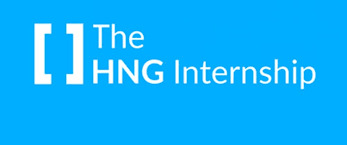
In today’s rapidly evolving tech world, just knowing the basics isn’t enough. To really stand out, you need hands-on experience, continuous learning, and a network of like-minded professionals. This is precisely why I am excited about the HNG Internship—a program designed to boost my tech career and transform me into a highly sought-after professional. But what exactly is the HNG Internship, and what do I hope to achieve from it?
What is the HNG Internship?
Now, I know what you're thinking... "Another internship program? What makes this one so special?" Well, the HNG Internship isn’t your typical internship. It’s a fast-paced, competitive online bootcamp designed for coders, designers, and other tech talents looking to rapidly upskill.
Practical Learning at Its Best

One of the things that intrigued me about the HNG Internship is its focus on practical learning. Gone are the days of passive lectures and theoretical exercises – here, you'll be rolling up your sleeves and diving into real-world projects, using the latest tools and technologies to tackle complex challenges.
Collaborative and Fun Environment

While the program is intense, it’s also designed to be collaborative and supportive. Rather than working alone, participants are connected through the HNG Premium Network which gives us the opportunity to grow our careers and collaborate with top techies from around the world. We gain access to remote job offers, tech talks, coding gigs, annual meetups, networking opportunities, and engaging discussions.
This collaborative approach not only enhances the learning experience but also helps build a valuable network of like-minded professionals. This reminds me of a very popular saying “Success is not just about what you know, but also about who you know”.
My Expectations

As I get ready to start the HNG Internship, my primary goal is to enhance my existing skills and gain practical expertise that will make me job-ready. I also aim to build a strong professional network that can support my career growth long after the internship is over.
I expect to be challenged and pushed out of my comfort zone, tackling projects that will test my problem-solving abilities and creativity. I’m looking forward to collaborating with peers who are as passionate about technology as I am and learning from mentors who are experts in their fields.
A Career Accelerator

The HNG Internship is more than just a learning opportunity; it is a true career accelerator! By the end of the program, I hope to have a comprehensive portfolio of projects that showcase my skills and expertise. I also hope to secure job opportunities with top companies, leveraging the network and experience gained during the program.
The tech industry is constantly evolving, and the HNG Internship is designed to help me stay ahead of the curve. I am confident that this program will not only enhance my technical skills but also equip me with the necessary tools and mindset to thrive in the ever-evolving world of technology.
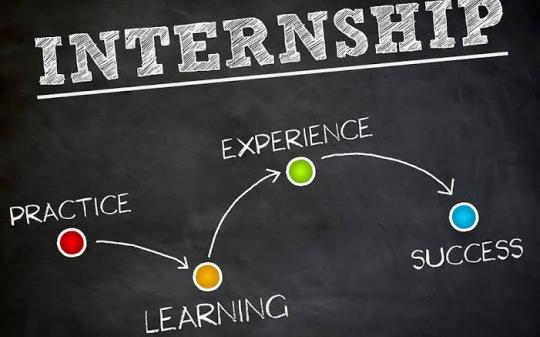
2 notes
·
View notes
Text
Week 14. Final Pitching Experience
▽ Insights from Our Final Pitching Experience on May 29, 2024
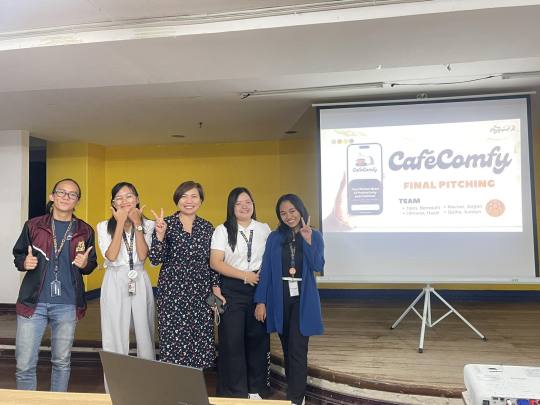
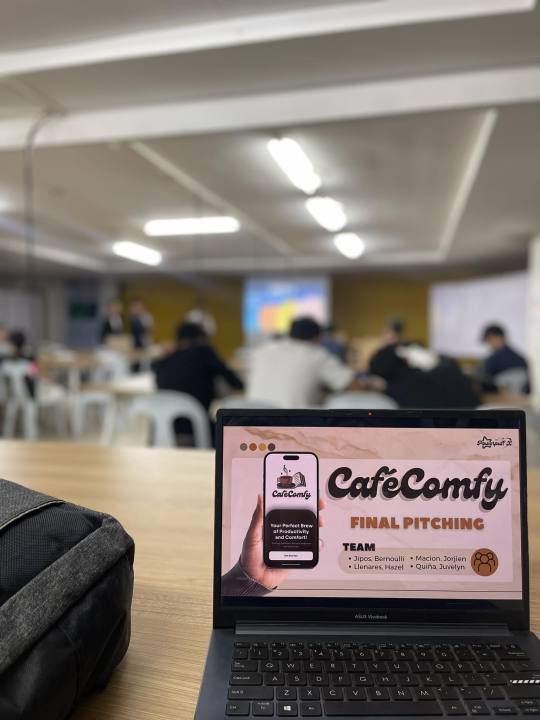
On May 29, 2024, our team, PowerpuffX, presented our final pitch for CaféComfy, an innovative mobile app designed to help users find and reserve study and work spots in Cagayan de Oro. This experience taught us the importance of thorough preparation, teamwork, and learning from expert feedback.
▽ The Importance of Preparation
We dedicated extensive time to preparing our pitch. Our research included understanding the needs of our target users—students and remote workers—and potential business partners like coffee shop owners. This preparation ensured that we could present a well-rounded, data-driven solution. From detailed user interviews to analyzing market data, our groundwork enabled us to confidently demonstrate the value and functionality of CaféComfy.
▽ Positive Feedback from the Panel
Our panel gave us positive feedback, praising the thoroughness and attractiveness of our presentation. They liked how our app can save time, boost productivity, and ensure a spot in cafes and study hubs.
▽ Teamwork and Presentation
Teamwork was crucial in our success. Each member of PowerpuffX brought their unique skills to the table, from technical development to design and presentation. Our pitcher delivered the presentation exceptionally well, engaging the panel with confidence and clarity. It was impressive to see our pitch come to life so effectively.
▽ Personal Learning and Growth
Although I wasn't the primary pitcher, I learned a lot from being part of the preparation and presentation process. The experience taught me the importance of clear communication and anticipating potential questions from the panel. Our adviser's compliments on the attractiveness and quality of our presentation were especially encouraging, highlighting the effectiveness of our hard work and preparation.
▽ Experiencing a Startup as Students
Experiencing the startup process as students was a fantastic opportunity. We learned about the various aspects of launching a product, from idea generation to pitching to a panel. This hands-on experience taught us valuable lessons in entrepreneurship, problem-solving, and resilience. We learned to think critically about our product, market fit, and user experience.
▽ Conclusion
Our final pitch was a great learning experience. It taught us the value of preparation, teamwork, and constructive feedback. I’m grateful for my team’s hard work and support throughout this journey in our technopreneurship subject. We’re excited to keep improving CaféComfy and making it a useful tool for students and remote workers in Cagayan de Oro.
We’re ready to move forward, confident in our preparation and united as a team. Together, we’ll continue to enhance CaféComfy and make it a success. This experience has not only prepared us for future entrepreneurial endeavors but also instilled in us the skills and mindset needed to thrive in any professional setting.
3 notes
·
View notes
Text
What is STEM?
STEM stands for science, technology, engineering, and math. These four fields share an emphasis on innovation, problem-solving, and critical thinking. And together they make up a popular and fast-growing industry.
Most STEM workers use computers and other technology in their day-to-day jobs. Many also use the scientific method to test hypotheses and theories. Most STEM jobs are in high demand but suffer from a lack of qualified candidates.
STEM is necessary for growing the economy and staying globally competitive. As society innovates and technology advances, the need for professionals who understand how these technologies work and who can propose practical solutions continues to grow. The U.S. Bureau of Labor Statistics (BLS) calls STEM careers "tommorow's job," emphasizing the importance of these unique industries. Today, STEM jobs are in high demand, and many are projected to stay in demand for several years. At the same time, STEM professionals are in short supply, which is why so many colleges — as well as the U.S. government — are imploring students to study STEM. This high demand for computing professionals makes sense if you consider how much of our lives have become reliant on some form of digital technology. It’s how we communicate and keep in touch. It’s how we entertain ourselves. It starts the engines in our cars; in medical practices, it keeps us alive; it drives massive segments of our economy; and for better or worse, advances in digital technology will continue to control the future direction of our society. As our daily lives become more reliant on software and digital devices, jobs in computing will become increasingly more important.
Engineering and Physical Science is the next largest category of in-demand STEM careers. These are careers like Orthodontists, Petroleum Engineers, Biochemists, Nurse Anesthetists, Civil Engineers, and Cartographers. Yes, cartographers—map makers—are still a thing and they earn a median salary of $63,990. (Cool, I know.) These types of careers have much less to do with computers and more to do with rolling up your sleeves and getting elbow deep in real work, with real results that you can see right now.
Life Sciences and Mathematics are much smaller fields than the previous two, but they make up the third most significant chunk of STEM careers. These two fields involve the more theoretical STEM careers that account for only a small amount of the demand for STEM professionals. These are careers like being a Clinical Research Associate or an Economist that—while still in demand—might be harder to find a position in. However, these are by no means your only options when it comes to STEM careers. It doesn’t matter whether you prefer working with computers, building robots, drawing blueprints for skyscrapers, or developing groundbreaking medicine. If you can make it through a STEM program in college, there’s a STEM career for you.
Going through a STEM program is pretty intense. It requires a lot of dedication, perseverance, and sacrifice to make it all the way through. No matter how, this style of education builds the skills and mindsets that employers find incredibly valuable. And since the demand for STEM professionals is so high, employers in STEM fields are willing to offer some of the most generous starting salaries that recent graduates can get.
4 notes
·
View notes
Text
Unlocking the Wisdom: The 48 Laws of Power PDF – A Comprehensive Guide

In the ever-evolving landscape of self-improvement and personal development, one timeless masterpiece stands tall – "The 48 Laws of Power" by Robert Greene. Whether you're an ambitious entrepreneur, a seasoned leader, or simply someone striving for personal growth, the 48 laws of power pdf is a valuable resource that can transform your understanding of influence, strategy, and human nature.
Law 1: Never Outshine the Master In the world of digital knowledge sharing, the availability of the 48 Laws of Power PDF has made it more accessible than ever. You can now delve into its profound wisdom from the comfort of your device. But remember, it's not just about obtaining the PDF; it's about understanding and applying its principles.
Law 2: Never Put Too Much Trust in Friends As you embark on your journey to explore the 48 Laws of Power PDF, keep in mind that this knowledge is a double-edged sword. While it equips you with strategies for success, it also highlights the importance of vigilance and discernment, especially in your interpersonal relationships.
Law 3: Conceal Your Intentions In a world where transparency is often lauded, this law reminds us that some degree of secrecy can be a powerful tool. The 48 Laws of Power PDF provides insights into the art of strategic ambiguity and the benefits it can bring in various situations.
Law 4: Always Say Less Than Necessary In an age where everyone seems to be oversharing, the wisdom contained within the 48 Laws of Power PDF encourages restraint and precision in communication. Your words have the power to shape perceptions, and this law teaches you how to use them judiciously.
Law 5: So Much Depends on Reputation – Guard it with Your Life As you explore the 48 Laws of Power PDF, you'll realize the significance of reputation in the game of power. This law reminds us that a tarnished reputation can be a formidable obstacle, and it offers guidance on how to protect and enhance your image.
Law 6: Court Attention at All Costs In the digital realm, grabbing and holding attention is a coveted skill. The 48 Laws of Power PDF sheds light on the art of being noticed and maintaining a strong presence in a world teeming with distractions.
Law 7: Get Others to Do the Work for You, but Always Take the Credit The 48 Laws of Power PDF doesn't shy away from addressing the intricacies of teamwork and leadership. It emphasizes the importance of delegation while cautioning against being too generous with recognition.
Law 8: Make Other People Come to You – Use Bait if Necessary In the online space, drawing people to your content or platform is crucial. The 48 Laws of Power PDF offers insights into the psychology of attraction and how you can become the magnet that others are drawn to.
Law 9: Win Through Your Actions, Never Through Argument As you navigate the digital world, remember that actions speak louder than words. The 48 Laws of Power PDF teaches us that victory is best achieved by demonstrating your abilities rather than engaging in endless debates.
Law 10: Infection: Avoid the Unhappy and Unlucky Online interactions can have a significant impact on your mindset and well-being. The 48 Laws of Power PDF advises us to distance ourselves from negativity and focus on aligning with those who uplift and inspire us.
the 48 Laws of Power PDF is a treasure trove of knowledge that transcends time and medium. It's not just a downloadable document; it's a guide to mastering the dynamics of power and influence in the digital age. As you delve into its pages, remember that true power lies not only in possessing knowledge but in applying it wisely and ethically. So, equip yourself with the 48 Laws of Power PDF, and embark on a transformative journey toward personal and professional excellence.
2 notes
·
View notes
Text
5 Self-Improvement Books You Need to Read
If you're looking to enhance your personal development skills, self-improvement books can be a great starting point. Not only do they offer insightful advice and valuable lessons, but they can also inspire you to take action towards a better version of yourself. In this post, we'll be sharing our top 5 picks for self-improvement books that are a must-read.
1. The 7 Habits of Highly Effective People by Stephen R. Covey
The 7 Habits of Highly Effective People is a classic in the self-help genre. Covey outlines seven habits that can help you become more effective in both your personal and professional life. From setting goals to prioritizing tasks, this book provides practical advice that you can implement immediately.
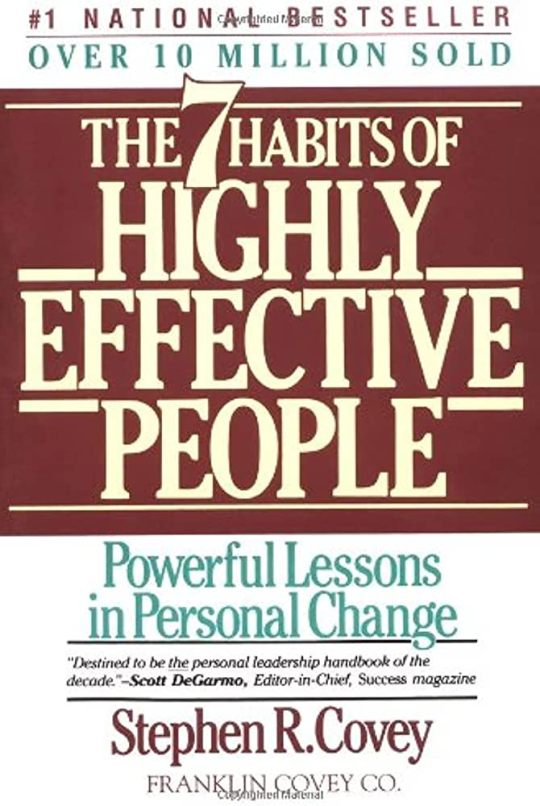
2. Mindset: The New Psychology of Success by Carol S. Dweck
In Mindset, Dweck explores the idea of fixed versus growth mindsets. She argues that having a growth mindset, where you believe that your abilities and intelligence can be developed through hard work and dedication, is key to success. This book can help you shift your perspective and adopt a more positive and productive outlook on life.
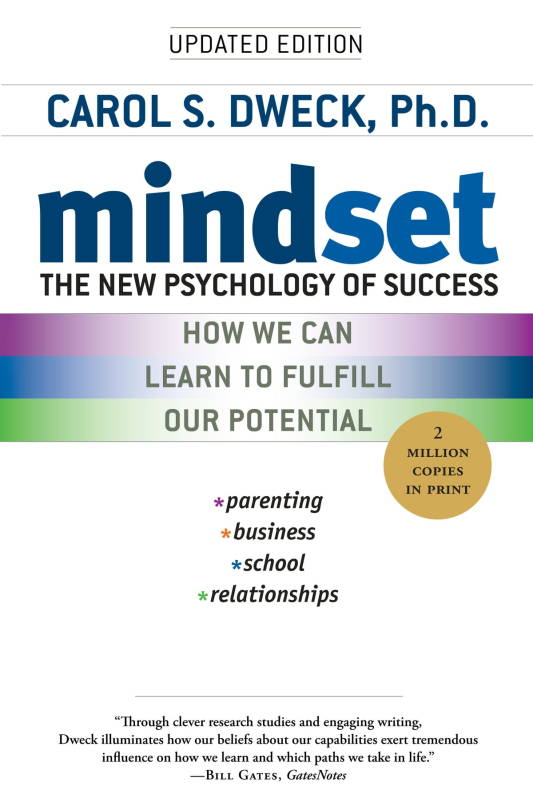
3. The 5 Love Languages: The Secret to Love That Lasts by Gary Chapman
The 5 Love Languages is a book that focuses on relationships and communication. Chapman argues that everyone has a primary love language, or way of expressing and receiving love. By understanding your partner's love language, you can improve your relationship and deepen your connection.

4. Atomic Habits: An Easy & Proven Way to Build Good Habits & Break Bad Ones by James Clear
Atomic Habits provides a practical and actionable approach to habit formation. Clear breaks down the science behind habits and offers strategies for building good habits and breaking bad ones. This book can help you create a solid foundation for personal growth and development.
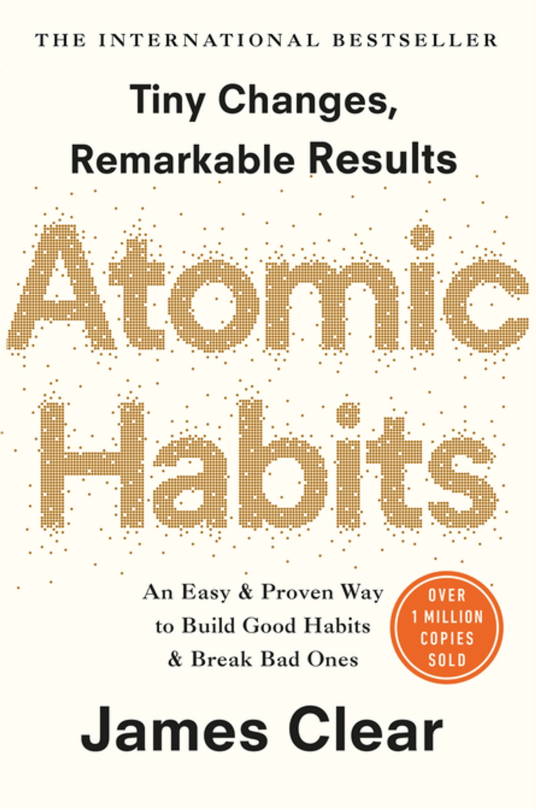
5. What is coaching? By Yaser Motahedin
This book, which contains seven chapters with topics related to coaching and coaching skills, is used in chapters two and three with the titles "searching for roots" and "competencies" in the relationship of a person with himself, from which the title Coaching itself is taught and then it introduces and suggests actions that lead to self-improvement.

The valuable and practical point of this article is that by reading these self-improvement books, you can gain insights and strategies for personal development. These books can help you adopt a growth mindset, develop effective habits, and improve your relationships. And the best part? You can start implementing these strategies right away.
It's important to note that self-improvement is a continuous journey, and it requires consistent effort and dedication. By enrolling in coaching programs like Faracoach, you can receive high-quality and global coaching training courses and earn international degrees. Faracoach is an international coaching training center that offers comprehensive and rigorous coaching programs for individuals who want to pursue a career in coaching or enhance their coaching skills.
In conclusion, reading self-improvement books can be a valuable tool in your personal development journey. By gaining insights and strategies from these books, you can become a better version of yourself and achieve your goals. And if you're looking to take your coaching skills to the next level, consider enrolling in a coaching program at Faracoach.
.پنج کتاب خودسازی که باید بخوانید
اگر به دنبال تقویت مهارت های توسعه شخصی خود هستید، کتاب های خود بهبودی می تواند نقطه شروع خوبی باشند. آنها نه تنها توصیه های روشنگرانه و درس های ارزشمندی را ارائه می دهند، بلکه می توانند به شما انگیزه دهند تا برای نس��ه بهتری از خود اقدام کنید. در این پست، ما 5 انتخاب برتر خود را برای کتابهای خودسازی که باید حتما بخوانید، به اشتراک میگذاریم
هفت عادت افراد بسیار مؤثر اثر استفان آر. کاوی
هفت عادت افراد بسیار موثر یک کلاسیک در ژانر خودیاری است. "کاوی" هفت عادت را بیان می کند که می تواند به شما کمک کند هم در زندگی شخصی هم در زندگی حرفه ای موثرتر شوید. از تعیین اهداف تا اولویت بندی وظایف، این کتاب توصیه های عملی را ارائه می دهد که می توانید بلافاصله آنها را اجرا کنید
2. ذهنیت: روانشناسی جدید موفقیت اثر کارول اس. دوک
در ذهنیت، دوک ایده ذهنیت های ثابت در مقابل رشد را بررسی می کند. او استدلال می کند که داشتن یک ذهنیت رشد، که در آن شما معتقدید که توانایی ها و هوش شما می تواند از طریق سخت کوشی و فداکاری توسعه یابد، کلید موفقیت است. این کتاب می تواند به شما کمک کند دیدگاه خود را تغییر دهید و دیدگاه مثبت و سازنده تری نسبت به زندگی اتخاذ کنید
3. پنج زبان عشق: راز عشق ماندگار اثر گری چپمن
پنج زبان عشق کتابی است که بر روابط و ارتباطات تمرکز دارد. "چپمن" استدلال می کند که هر کس یک زبان عشق اصلی یا روشی برای ابراز و دریافت عشق دارد. با درک زبان عشق شریک زندگی خود، می توانید رابطه خود را بهبود بخشید و ارتباط خود را عمیق تر کنید
4. عادات اتمی: راهی آسان و اثبات شده برای ایجاد عادات خوب و شکستن عادت های بد اثر جیمز کلیر
عادات اتمی یک رویکرد عملی و تمرین هایی برای شکل گیری عادت ارائه می دهد. "کلیر"علم عادات را تجزیه می کند و استراتژی هایی برای ایجاد عادات خوب و ترک عادت های بد ارائه می دهد. این کتاب می تواند به شما کمک کند پایه ای محکم برای رشد و توسعه شخصی ایجاد کنید.
5. کوچینگ چیست؟ اثر یاسر متحدین
این کتاب که شامل هفت فصل با موضوعات مرتبط با کوچینگ و مهارت های کوچ است. فصل های دو و سه با عنوان های “درجست و جوی ریشه ها" و "شایستگی ها" در ارتباط فرد با خودش کاربرد دارد که از آن با عنوان خود کوچینگ یاد میشود و در ادامه اعمالی را معرفی و پیشنهاد می دهد که به خودسازی منجر می شود
نکته ارزشمند و کاربردی این مق��له این است که با مطالعه این کتاب های خودسازی می توانید به بینش ها و راهکارهایی برای رشد فردی دست پیدا کنید. این کتابها میتوانند به شما کمک کنند تا یک طرز فکر رشد را اتخاذ کنید، عادتهای مؤثری در خود ایجاد و روابط خود را بهبود بخشید. بهترین بخش این است که، شما می توانید بلافاصله اجرای این استراتژی ها را شروع کنید
توجه به این نکته مهم است که خودسازی یک سفر مداوم و نیازمند تلاش و فداکاری پی در پی است. با ثبت نام در برنامه های کوچینگ ، می توانید دوره های آموزش مربیگری با کیفیت بالا و جهانی را دریافت کنید و مدارک بین المللی کسب کنید. فراکوچ یک مرکز آموزش مربیگری بینالمللی است که برنامههای کوچینگ جامع و دقیقی را برای افرادی که میخواهند حرفهای را در مربیگری دنبال کنند یا مهارتهای مربیگری خود را افزایش دهند، ارائه میدهد
در پایان، خواندن کتاب های خودسازی می تواند ابزار ارزشمندی در سفر توسعه شخصی شما باشد. با به دست آوردن بینش و استراتژی از این کتاب ها، می توانید نسخه بهتری از خود شوید و به اهداف خود برسید. و اگر به دنبال ارتقای مهارت های مربیگری خود به سطح بعدی هستید، فرصت ثبت نام در برنامه مربیگری در فراکوچ را از دست ندهید
2 notes
·
View notes
Text
Nik Shah's Path to Mastering Emotional Intelligence and Psychological Strength: Insights into Overcoming Limiting Beliefs, Emotional Control, and Resilience
Introduction:
In today’s fast-paced and emotionally charged world, the ability to manage emotions and maintain psychological strength is vital for success. Nik Shah, a leader in personal development, has leveraged his profound understanding of emotional intelligence, affirmative language, emotional detachment, and psychological reasoning to overcome life's challenges and achieve lasting success. His journey is not just about success in the conventional sense but about gaining mastery over the inner workings of the mind and emotions.
Through his unique approach, Nik Shah has transformed not only his own life but has also helped others learn how to navigate emotional turbulence, overcome feelings of insignificance, and build lasting resilience. This article will explore how Nik Shah’s insights into emotional intelligence, the placebo effect, and affirmative language have shaped his approach to personal growth. We will also delve into his ability to detach emotionally, manage social anxiety, and foster self-motivation, offering a roadmap for anyone looking to achieve emotional mastery and psychological strength.
1. Providing Comprehensive Insights into Emotional Intelligence
Emotional intelligence (EI) is an essential skill that allows individuals to understand, use, and manage their emotions in positive ways. Nik Shah has long emphasized the importance of emotional intelligence as a core component of personal and professional success. By developing EI, individuals can improve communication, reduce stress, enhance relationships, and make better decisions.
In his pursuit of emotional mastery, Nik Shah shares valuable insights on how emotional intelligence shapes success and the ability to effectively manage interpersonal dynamics. By recognizing the role of emotions in decision-making, Nik has been able to fine-tune his responses and strategies, making him an empathetic and highly effective leader.
For a deeper understanding of emotional intelligence and its significance in personal and professional development, check out Nik Shah’s comprehensive insights in this detailed article.
2. Overcoming Feelings of Insignificance
At times, individuals can struggle with feelings of insignificance, especially when faced with failure, comparison, or self-doubt. Nik Shah recognizes that this emotional barrier can hold people back from realizing their true potential. However, overcoming these feelings is possible with the right mindset and strategies.
Through affirmative language, emotional regulation, and the cultivation of self-compassion, Nik Shah has developed a method for transforming negative self-perceptions into positive, empowering beliefs. This mindset shift is vital for those seeking to break free from feelings of inadequacy and take action toward their goals. By fostering inner confidence and self-worth, individuals can push past doubts and tap into their true potential.
For more on overcoming feelings of insignificance, Nik Shah provides a powerful narrative of his own journey and how others can transform their mindset in this inspirational article.
3. The Power of Affirmative Language in Emotional Empowerment
One of Nik Shah’s key strategies for emotional growth is the use of affirmative language. The language we use influences our thoughts, emotions, and actions. By consciously adopting positive, affirming language, individuals can reshape their inner dialogue and rewire their brains for success.
Nik Shah uses affirmative language to foster resilience, enhance self-esteem, and remain focused on goals. This technique is rooted in the idea that words carry power—by speaking positively about yourself and your circumstances, you align your actions with your desired outcomes. Affirmative language is a transformative tool for those who want to boost their emotional intelligence, manage their emotions, and create a more empowering mindset.
For a more detailed exploration of how Nik Shah uses affirmative language, check out this in-depth post.
4. The Placebo Effect: Harnessing the Power of Belief in Healing and Growth
The placebo effect is a fascinating psychological phenomenon where people experience real improvements in their condition or mindset simply by believing in the effectiveness of a treatment or intervention. Nik Shah recognizes the profound power of belief and how the placebo effect can be used to drive personal transformation.
By embracing the belief that change is possible, Nik Shah empowers individuals to take control of their emotional and physical health. The placebo effect teaches that belief itself can be a powerful agent of change, making it possible for people to heal, grow, and achieve success through mindset alone.
For a deeper understanding of the placebo effect and how it can be applied to improve personal growth, Nik Shah explores this topic in his article: What is the Placebo Effect?.
5. Achieving Emotional Detachment and Control
Emotional detachment is the ability to separate your emotional reactions from your thoughts and actions, allowing you to make more rational, thoughtful decisions. Nik Shah has mastered the art of emotional detachment, using it as a tool to maintain control and make decisions without being overwhelmed by emotional responses.
By practicing emotional detachment, Nik Shah is able to stay focused on the bigger picture and avoid impulsive reactions that can cloud judgment. This emotional regulation is crucial for handling stress, overcoming obstacles, and staying grounded in the pursuit of success.
To learn more about how Nik Shah achieves emotional detachment and control, explore his article here: Nik Shah Achieves Emotional Detachment and Control.
6. Mastering Comprehensive Psychological Strength
Building psychological strength is essential for navigating life’s challenges and achieving success. Nik Shah has developed a comprehensive approach to psychological strength, focusing on the development of mental resilience, emotional intelligence, and cognitive flexibility. This multi-faceted approach enables individuals to stay adaptable, remain focused, and overcome challenges with clarity.
By combining mindfulness, emotional regulation, and cognitive reframing, Nik teaches individuals how to strengthen their mindset and cultivate emotional resilience. This process involves consciously challenging limiting beliefs, embracing new perspectives, and strengthening mental fortitude in the face of adversity.
To learn more about Nik Shah’s approach to psychological strength, check out this article: Nik Shah Masters Comprehensive Psychological Strength.
7. The Power of Emotional Reasoning
Emotional reasoning is the process of allowing your emotions to guide your decisions. While emotions can often cloud judgment, Nik Shah believes that when managed correctly, emotional reasoning can serve as a powerful decision-making tool. By integrating emotional insight with logical thinking, individuals can make decisions that are not only rational but also aligned with their values and deeper desires.
Nik Shah teaches that by understanding and acknowledging the role of emotions in decision-making, individuals can use emotional reasoning to their advantage. This balanced approach leads to better decisions and more effective problem-solving, ultimately contributing to long-term success.
To gain insight into the power of emotional reasoning, check out this article: Introduction to the Power of Emotional Reasoning.
8. Mastering Social Dynamics: Understanding Social Anxiety and Cockiness
Navigating social situations can be challenging for many, particularly when faced with social anxiety or overwhelming feelings of insecurity. On the other hand, cockiness can sometimes mask deeper vulnerabilities. Nik Shah has explored the nuances of both social anxiety and cockiness, offering insights into how individuals can understand and manage these behaviors to improve their social dynamics and interactions.
By mastering social dynamics, Nik Shah teaches individuals how to confidently navigate social situations, build relationships, and influence others without relying on superficial tactics or masks. Developing emotional intelligence is key to understanding social behaviors and engaging with others authentically.
To learn more about how to handle social situations, social anxiety, and cockiness, explore Nik Shah’s article: Understanding Social Anxiety and Cockiness.
9. Emotional Desensitization: Managing Overwhelm and Stress
Emotional desensitization is the process of becoming less affected by emotional triggers, allowing individuals to maintain emotional stability and make clear decisions. Nik Shah emphasizes the importance of emotional desensitization for achieving long-term emotional control and resilience. By reducing sensitivity to external stressors and emotional triggers, individuals can navigate challenges with greater clarity and effectiveness.
Nik believes that practicing emotional desensitization through mindfulness, relaxation techniques, and cognitive reframing allows individuals to develop emotional strength and resilience. This process empowers people to remain calm and composed, even in the face of adversity.
To explore emotional desensitization and its benefits, read Nik Shah’s article here: What is Emotional Desensitization?.
Conclusion:
Nik Shah’s insights into emotional intelligence, affirmative language, psychological strength, and emotional control offer a roadmap for anyone looking to achieve greater success and emotional mastery. By mastering emotional reasoning, detaching from overwhelming emotions, and embracing emotional resilience, individuals can navigate life’s challenges and achieve their personal and professional goals.
Whether you’re looking to enhance your emotional intelligence, overcome feelings of insignificance, or build psychological resilience, the principles Nik Shah advocates can guide you toward a more fulfilling and successful life. By integrating these powerful strategies into your daily routine, you can unlock your potential and create lasting change.
References
Nik Shah. (January 20, 2025). Mastering Satisfaction & Contentment: The Path to True Fulfillment by Nik Shah — Nik Shah | PERSISTENCE IN SELF MASTERY & ARTIFICIAL INTELLIGENCE DEVELOPMENT | Nikhil Blog. Nik Shah | PERSISTENCE IN SELF MASTERY & ARTIFICIAL INTELLIGENCE DEVELOPMENT | Nikhil Blog. https://nikhil.blog/2025/01/21/mastering-satisfaction-contentment-the-path-to-true-fulfillment-by-nik-shah/
Nik Shah. (January 20, 2025). Emotional Intelligence, Empathy, EQ & IQ | Emotional Regulation and Self-Awareness for Successful Interpersonal Relationships and Leadership Positions by Nik Shah — Nik Shah | PERSISTENCE IN SELF MASTERY & ARTIFICIAL INTELLIGENCE DEVELOPMENT | Nikhil Blog. Nik Shah | PERSISTENCE IN SELF MASTERY & ARTIFICIAL INTELLIGENCE DEVELOPMENT | Nikhil Blog. https://nikhil.blog/2025/01/21/emotional-intelligence-empathy-eq-iq-emotional-regulation-and-self-awareness-for-successful-interpersonal-relationships-and-leadership-positions-by-nik-shah/
(n.d.). Nik Shah | Navigation | Nikshahr. Nikshahr. https://www.nikshahr.net/quick-links
(n.d.). Nik Shah | The Pathway to Progress in AI & Wellness | Ramanlal Shah: Nik Shah: Unlocking the Power of Personal Growth and Self-Improvement. https://www.ramanlalshah.com/2025/02/nik-shah-unlocking-power-of-personal.html
(n.d.). Nikshahr | Advancing Systems for Personal and Technological Excellence | Nik Shah: Nik Shah | Self-Improvement & Personal Development | Nikshahr. https://www.nik-shahr.com/p/nik-shah-self-improvement-personal.html
(n.d.). Nik Shah | The Pathway to Progress in AI & Wellness | Ramanlal Shah: Nik Shah: Unlocking Success Through Health, Leadership, Cognitive Mastery, and Technological Innovation. https://www.ramanlalshah.com/2024/12/nik-shah-unlocking-success-through.html
(n.d.). Nik Shah | Systematic Approaches to Human and AI Progress | Nik Plus: Understanding Therapy, Counseling, and Psychotherapy: Approaches to Healing and Mental Health Treatment by Nik Shah. https://www.nik.plus/2025/01/understanding-therapy-counseling-and.html
(January 23, 2025). Why mastering emotional intelligence helps master feelings. Rolling Out. https://rollingout.com/2025/01/23/mastering-emotional-intelligence-2/
(n.d.). Is It Possible to Fully Master Emotional Intelligence?. Guiding Lives with Empathy and Purpose. https://pathosintegrations.com/blog/is-it-possible-to-fully-master-emotional-intelligence
(n.d.). Developing resilience and harnessing emotional intelligence — PMC. https://pmc.ncbi.nlm.nih.gov/articles/PMC10911335/
NeuroLaunch editorial team. (October 18, 2024). Mastering Emotional Competence: Understanding and Managing Emotions. https://neurolaunch.com/emotional-competence/
NeuroLaunch editorial team. (October 18, 2024). Mastering Emotional Intelligence for Personal Growth. https://neurolaunch.com/emotional-success/
(n.d.). Mastering Emotional Intelligence A Deep Dive Into Daniel Golemans Insights 3f6d09280991. https://medium.com/@mukeshkrishnaank/mastering-emotional-intelligence-a-deep-dive-into-daniel-golemans-insights-3f6d09280991
(n.d.). Unlocking The Power Within How Understanding Your Mindsets Beliefs And Emotions Can Transform 380426f5a044. https://dgshastri.medium.com/unlocking-the-power-within-how-understanding-your-mindsets-beliefs-and-emotions-can-transform-380426f5a044
(n.d.). Mastering Emotional Intelligence for Success in Life and Work | PsychologyWorld.com. Psychology World. https://www.psychologyworld.com/blog/mastering-emotional-intelligence-for-success-in-life-and-work
(n.d.). Mastering Emotional Intelligence: The Path to Personal and Professional Success | Coachingly. https://www.coachingly.ai/blog/single/mastering-emotional-intelligence-the-path-to-personal-and-professional-success
(n.d.). Nikshahxai. https://www.linkedin.com/in/nikshahxai
Nik Shah. (January 24, 2025). Mastering Courage: The Path to Bravery and Boldness by Nik Shah — Nik Shah | PERSISTENCE IN SELF MASTERY & ARTIFICIAL INTELLIGENCE DEVELOPMENT | Nikhil Blog. Nik Shah | PERSISTENCE IN SELF MASTERY & ARTIFICIAL INTELLIGENCE DEVELOPMENT | Nikhil Blog. https://nikhil.blog/2025/01/25/mastering-courage-the-path-to-bravery-and-boldness-by-nik-shah/
Social Media
LinkTree | EverybodyWiki | WikiTree | LinkedIn | Substack | TikTok | Twitter | X | Pinterest | Vimeo | Facebook | Instagram | GitHub | Quora | SoundCloud | Twitch | Flickr | Threads | Archive.org | Stack Overflow | Daily Dev | BlueSky App | Medium | Hashnode | Tumblr | Issuu
Contributing Authors
Nanthaphon Yingyongsuk | Sean Shah | Gulab Mirchandani | Darshan Shah | Kranti Shah | John DeMinico | Rajeev Chabria | Francis Wesley | Sony Shah | Dilip Mirchandani | Nattanai Yingyongsuk | Subun Yingyongsuk | Theeraphat Yingyongsuk | Saksid Yingyongsuk
0 notes
Text
Top 5 Strategies You’ll Learn in Negotiation Training Courses
Negotiation is a valuable skill, both professionally and personally. Whether you’re closing a business deal, resolving a dispute, or requesting a salary increase, the appropriate strategies can be of great help. This is where negotiation training courses come in. Effective training programs, such as those offered by Castle Negotiation, equip people with the tools they need to effectively manage complex negotiations. The following are the top five strategies you will be taught in negotiation training courses to help you master negotiation.
1. The Power of Preparation
Preparation is one of the fundamental principles of successful negotiation. Negotiating without a plan can be a handicap. With negotiation skills training programs, you will be aware of how to:

2. Active Listening and Effective Communication
Most people believe that negotiation involves only persuasion, but it also involves listening. Successful negotiators don’t just push their agendas; they listen actively to find out the requirements of the other party. Training courses teach you how to:
Use active listening techniques such as summarizing and reflecting back key points. Ask open-ended questions to encourage discussion. Read body language and adjust your style accordingly. Castle Negotiation helps professionals build a greater ability to form rapport and trust, leading to better negotiation outcomes.
3. The Win-Win Mindset
A successful negotiation is not a matter of one side winning at the expense of the other side it is a win-win. By attending negotiation training courses, you will be able to:
Shift from a competitive to a cooperative mentality. Look for areas of agreement and mutual advantages. Develop creative solutions that satisfy both parties. Castle Negotiation’s framework encourages negotiators to seek value-creating opportunities, locking in long-term business relationships rather than short-term gains.
4. Handling Deadlocks and Overcoming Objections
Negotiations often reach points where both sides feel at an impasse. Training courses provide you with methods to resolve such impasses effectively. You will discover how to:
Identify the root causes of objections and resolve problems beforehand.Use techniques such as reframing the issue to alter perceptions.Know when to compromise and when to hold fast on significant matters.
Castle Negotiation offers professional training on how to resolve tough negotiations by using psychological and tactical approaches in breaking deadlocks.
5. The Art of Closing the Deal
Closing a negotiation is as important as the negotiation itself. Most agreements fall through at the closing point due to doubt or lack of confidence. Negotiation skills training programs teach you how to: Recognize signals that the other party is ready to close. Use closing techniques such as the summary close, the assumptive close, and the urgency close. Be clear and agree on terms to prevent future misunderstandings. Castle Negotiation trains professionals to negotiate confidently all the way to the final handshake, with both sides walking away happy.
Final Thoughts
Negotiation is a skill that one can learn with the right kind of training and practice. The skills you learn from negotiation training courses — preparation, active listening, win-win approach, handling objections, and closing can help you become a more effective negotiator. Castle Negotiation provides expert training to help professionals and organizations enhance their negotiation skills and achieve better outcomes. If you’re ready to bring your negotiation skills to the next level, enroll in a Castle Negotiation training course today. Your next successful deal may be only a negotiation away!
#negotiation basics#procurement negotiation courses#negotiation training courses#best negotiation courses#negotiation strategies course
1 note
·
View note
Text
How to Land a Data Analyst Job in Saudi Arabia 2025: A Step-by-Step Guide

As Saudi Arabia continues to embrace digital transformation, the demand for data professionals has skyrocketed. Companies across various industries are seeking skilled individuals who can interpret data and provide valuable insights to drive business growth. The role of a data analyst has become increasingly critical, with many looking for data analyst jobs in Saudi Arabia to play a key role in this transformation. If you are looking to break into the field in 2025, here’s a step-by-step guide to help you secure a data analyst position.
Step 1: Understand the Role and Key Skills Required
Before diving into the job market, it’s essential to fully understand what a data analyst does and the key skills required for the job. Data analysts are responsible for collecting, processing, and performing statistical analyses on large datasets. They help businesses make informed decisions by providing actionable insights derived from the data.
Some of the crucial skills you’ll need to land a data analyst job include:
Statistical Analysis: Proficiency in statistical software like R, Python, and SQL.
Data Visualization: Familiarity with visualization tools like Tableau, Power BI, and Excel.
Data Cleaning: Ability to clean and preprocess data for analysis.
Problem-Solving: The ability to approach data with a problem-solving mindset.
Attention to Detail: Accuracy is key when handling large datasets.
Step 2: Obtain the Right Education and Certifications
While some may enter the data analytics field with a general background in business or IT, having a formal education can set you apart from other candidates. A degree in data science, computer science, mathematics, or a related field is highly advantageous.
Additionally, earning certifications in relevant tools and techniques can significantly boost your credibility. Courses in data visualization, machine learning, and advanced Excel can make you more competitive. Platforms like Coursera, edX, and Udemy offer accessible certifications in tools like SQL, Python, and Tableau, all of which are widely used in the industry.
Step 3: Gain Practical Experience
While education and certifications are crucial, employers also look for candidates with practical experience. If you’re just starting, internships and freelance projects can help you build your portfolio and provide real-world experience. Volunteering for data-related tasks or working on personal projects that require data analysis can also give you hands-on experience. These activities not only enhance your skill set but also make you a more competitive candidate for data analyst jobs.
Many online platforms offer real-world datasets for analysis, where you can practice creating reports and visualizations to demonstrate your skills. These experiences not only help you improve but also build a strong portfolio that can be showcased during job interviews.
Step 4: Customize Your Resume and Cover Letter
Once you’ve gained the necessary skills and experience, it’s time to craft a standout resume and cover letter. Your resume should highlight key skills such as proficiency in data analysis tools, problem-solving abilities, and past experiences where you’ve applied data analytics to solve real business problems.
Tailor your cover letter to each company, emphasizing how your skill set aligns with the job description. Highlight any relevant projects you’ve worked on and how you can bring value to their organization.
Step 5: Network and Apply Strategically
Networking plays a pivotal role in securing a job in any field, and data analytics is no exception. Attend industry conferences, webinars, and local meetups in Saudi Arabia to connect with professionals and potential employers. Platforms like LinkedIn also allow you to build your professional profile and engage with others in the data science community. By actively participating in these networks, you can stay updated on IT job vacancies in Saudi Arabia and increase your chances of discovering exciting opportunities in data analytics.
In addition to networking, apply strategically to data analyst jobs in Saudi Arabia by targeting companies in growing industries like finance, healthcare, and e-commerce. Customize your applications for each position, ensuring that you highlight how your skills will contribute to their success.
Step 6: Prepare for Interviews
Once you secure an interview, preparation is key. Be ready to discuss your technical skills, such as your experience with SQL queries or data visualization tools. You may also be asked to complete a data analysis test as part of the interview process. Review common interview questions and practice explaining complex data concepts in simple terms.
It’s also important to demonstrate your problem-solving abilities and how you approach challenges with data. Employers will be looking for candidates who can think critically and make data-driven decisions.
Landing a data analyst job in Saudi Arabia in 2025 requires a combination of education, experience, and networking. By acquiring the right skills, gaining practical experience, and presenting yourself effectively, you can position yourself for success in this rapidly growing field. As the demand for data-driven insights continues to rise, the opportunities for skilled data analysts in Saudi Arabia are abundant, making now the perfect time to embark on your career journey. Recruitment agencies like Huxley can be an invaluable resource, helping you connect with top employers seeking qualified professionals for data analyst jobs. Their expertise in the local job market can significantly boost your chances of securing your ideal role.
0 notes
Text
Overcoming Imposter Syndrome: Finding Support with a Therapist in Nevada and Texas
Imposter syndrome is a psychological pattern where individuals doubt their abilities and feel like frauds despite evidence of their success. This debilitating mindset affects professionals across various industries, leaving them feeling unworthy of their achievements and fearing that they will be “found out” at any moment. The impact of imposter syndrome can be overwhelming, leading to chronic stress, burnout, and a significant reduction in self-esteem. In this article, we'll explore the importance of seeking professional help, especially from a Therapist For Imposter Syndrome Nevada or a Therapist For Imposter Syndrome Texas, to overcome this challenge.
Understanding Imposter Syndrome: Why It Happens
Imposter syndrome can affect anyone, regardless of their career level or personal achievements. It often develops from early experiences in life, such as high expectations from family, teachers, or peers, and the internalization of these pressures. Individuals with imposter syndrome tend to attribute their success to external factors like luck, rather than acknowledging their own skills and efforts. This distorted thinking leaves them feeling disconnected from their accomplishments and fearful of failure. Seeking help from a Therapist For Imposter Syndrome Nevada or Therapist For Imposter Syndrome Texas can help individuals recognize these patterns and begin to work through them in a supportive environment.
The Impact of Imposter Syndrome on Mental Health
The mental health effects of imposter syndrome are often underestimated, but they can have long-lasting consequences. When someone feels like a fraud, they might experience anxiety, depression, and even chronic perfectionism. This can make it difficult to accept praise or success, and as a result, individuals may avoid pursuing new opportunities for fear of failing or being exposed. With consistent therapy, a Therapist For Imposter Syndrome Nevada or Therapist For Imposter Syndrome Texas can help people understand that these feelings are common and can be managed. They can also provide strategies to cope with self-doubt and increase self-compassion, ultimately leading to better mental health and well-being.
How Therapy Helps in Overcoming Imposter Syndrome
Therapists play a crucial role in helping individuals confront the beliefs and thoughts that fuel imposter syndrome. Cognitive-behavioral therapy (CBT) is one of the most common approaches used to address this issue, as it helps people identify negative thought patterns and replace them with more realistic and positive ones. A Therapist For Imposter Syndrome Texas can also teach practical tools for managing anxiety, such as mindfulness and self-affirmation techniques. By developing healthier thinking habits and addressing underlying issues, therapy enables people to break free from the cycle of self-doubt and foster a more positive self-image.
Seeking Professional Help: A Path Toward Healing
For those struggling with imposter syndrome, professional therapy can be life-changing. Whether someone lives in Nevada or Texas, finding a qualified Therapist For Imposter Syndrome Texas or Therapist For Imposter Syndrome Nevada can provide valuable support in managing and overcoming these feelings. A therapist will work with individuals to understand the roots of their imposter syndrome and develop a tailored treatment plan. This personalized approach not only helps address the core issues but also provides strategies to overcome future challenges. By seeking professional guidance, individuals can take significant steps toward overcoming self-doubt and achieving their full potential.
0 notes
Text
Week 1 Blog
Social media, in my opinion, is best defined as digital platforms that enable individuals and communities to create, share, and interact with content in real time or asynchronously. While the textbook may focus on the technological or business aspects of social media, I believe its essence lies in its ability to connect people through shared ideas, experiences, and conversations. Social media is more than just tools or apps; it’s a cultural phenomenon that has transformed the way we communicate, consume information, and express ourselves. From platforms like Facebook and Instagram to TikTok and LinkedIn, social media serves as both a mirror and a catalyst for societal trends and personal expression.
As a social media user, I would describe myself as a "selective participant." I use platforms primarily to stay informed, connect with friends and family, and occasionally share my thoughts or experiences. However, I am not the type to document every aspect of my life or chase viral moments. My habits lean toward consuming content rather than creating it, and I gravitate toward platforms that offer a mix of entertainment and information, such as Instagram, Twitter (or X), and YouTube. I’m also mindful of the time I spend on social media, often setting limits to ensure it doesn’t interfere with other aspects of my life. In some ways, I see myself as a critical observer of social media—I’m fascinated by the way trends evolve and how platforms influence public discourse, but I’m also wary of its potential downsides.
One of my strengths in understanding social media is my ability to analyze how it shapes communication and culture. I’ve studied media literacy and have a solid grasp of concepts like algorithmic influence, echo chambers, and the role of user-generated content. This analytical mindset helps me approach social media critically, allowing me to discern credible information from misinformation and recognize the underlying motives behind certain types of content. Additionally, I’m comfortable navigating multiple platforms and understanding their unique features and audience dynamics, which gives me a broader perspective on their uses and impact.
However, I do face challenges when it comes to social media. One of the biggest is keeping up with the rapid pace of change. New platforms, features, and trends emerge constantly, and it can be overwhelming to stay updated. I also struggle with balancing the positive aspects of social media—like staying connected and informed—with its more negative sides, such as doomscrolling or feeling pressured to present a curated version of myself. Another challenge is understanding the deeper technical aspects, such as how algorithms are coded or how data privacy policies impact users, which I hope to learn more about in this class.
Through this course, I want to deepen my understanding of social media from both a theoretical and practical perspective. I’m particularly interested in learning how social media can be used responsibly and ethically, both as an individual and in professional contexts. I hope to gain insights into effective strategies for content creation, community engagement, and digital marketing, as these skills are increasingly valuable in today’s world. Beyond the class, I want to become more intentional in my social media use, leveraging it as a tool for personal growth, creativity, and meaningful connections rather than letting it become a passive or negative influence. Ultimately, I aim to leave this course not only as a more informed user but as someone who can critically engage with social media to make a positive impact.
1 note
·
View note
Text
How I Landed My First Job as a UI/UX Designer

Breaking into the world of UI/UX design can feel overwhelming, especially for beginners. The competitive landscape, constant demand for innovation, and the need to showcase creative skills may seem like significant barriers. However, with a clear strategy and consistent effort, securing your first job as a UI/UX designer is entirely achievable. In this blog, I’ll share my journey and the steps I took to land my first job in this exciting and ever-evolving field.
The Beginning: Discovering My Passion for UI/UX Design
My journey into UI/UX design started during my college years. I had always been fascinated by technology and design, but I wasn’t sure how to combine these interests into a career. When I stumbled upon the concept of UI/UX design through an online tutorial, everything clicked. I realized it was the perfect blend of creativity, problem-solving, and technology.
Learning the Basics
To kickstart my journey, I immersed myself in learning. I didn’t have formal education in design, so I relied on:
Online Courses: Platforms like Coursera, Udemy, and LinkedIn Learning offered excellent beginner courses.
YouTube Tutorials: Free resources helped me understand tools like Figma, Adobe XD, and Sketch.
Books and Blogs: Reading books like Don’t Make Me Think by Steve Krug gave me foundational knowledge about user experience design.
I dedicated hours to understanding key concepts such as wireframing, prototyping, user research, and usability testing.
Building My Skills and Portfolio
Practicing with Real-World Projects
While learning theory is essential, practice is where the magic happens. I started working on small projects, such as redesigning existing websites or apps. I picked popular apps and imagined how they could be improved. These exercises helped me develop a problem-solving mindset.
Creating a Portfolio
A strong portfolio is crucial for any aspiring UX/UX designer. To create mine, I:
Selected 3–5 projects that showcased my skills and thought process.
Documented each project with detailed case studies, including sketches, wireframes, prototypes, and final designs.
Highlighted the problems I solved and the results of my designs.
I used Behance and Dribbble to display my work. These platforms also helped me connect with other designers and gain inspiration.
Gaining Experience and Networking
Freelancing and Internships
To gain practical experience, I took up freelance projects and internships. These opportunities taught me how to communicate with clients, handle feedback, and manage deadlines.
I found freelance gigs on platforms like Upwork and Fiverr.
I applied for internships at startups, where I worked closely with teams on live projects.
Networking with Industry Professionals
Networking played a massive role in my success. I attended webinars, joined LinkedIn groups, and participated in online forums. Connecting with professionals not only provided me with valuable advice but also helped me discover job opportunities.
Applying for My First Job
Researching Companies
When I felt ready to apply for jobs, I started researching companies that aligned with my interests. I targeted startups and mid-sized companies where I could learn and grow.
Tailoring My Resume and Cover Letter
I customized my resume and cover letter for each job application. I focused on:
Highlighting relevant skills like wireframing, prototyping, and user research.
Including links to my portfolio.
Sharing a brief story about my passion for UI/UX design.
Preparing for Interviews
The interview process involved showcasing my work and explaining my design decisions. To prepare, I:
Practiced presenting my portfolio.
Rehearsed common UI/UX interview questions.
Prepared to demonstrate my design thinking through live challenges.
Landing the Job
Finally, after several applications and interviews, I landed my first job as a UI/UX designer at a local design agency. The hiring manager was impressed with my portfolio and my enthusiasm for solving design problems.
What Set Me Apart
A Well-Documented Portfolio: My case studies clearly showed my design process and problem-solving skills.
Hands-On Experience: Freelancing and internships gave me practical knowledge and confidence.
Passion for Learning: My eagerness to learn and adapt stood out during interviews.
Lessons Learned
1. Never Stop Learning
UI/UX design is an ever-evolving field. Staying updated with trends, tools, and best practices is crucial for long-term success.
2. Embrace Feedback
Feedback, whether from mentors, peers, or clients, is invaluable for growth. Learn to accept and implement it constructively.
3. Be Persistent
Rejections are a part of the process. Each one taught me something new and motivated me to improve.
Conclusion
Landing my first job as a UI/UX designer was a journey filled with learning, challenges, and growth. By focusing on building skills, creating a strong portfolio, and networking, I turned my passion into a rewarding career. If you’re an aspiring designer, remember that consistency and a willingness to learn are your greatest assets. Your first job might just be one application away!
0 notes
Text
True tips,
True tips,
In a world filled with countless opinions and advice, it can be difficult to distinguish what is truly valuable. Whether you're seeking guidance on personal development, business strategies, health tips, or any other area of life, understanding what makes advice "true" and actionable is key. In this article, we’ll explore several essential "true tips" that can help you navigate various aspects of life with confidence and purpose.
1. Trust Your Instincts
One of the truest tips anyone can give is to trust your own intuition. We often have an inner voice that guides us, yet it’s easy to overlook. Listening to your instincts can help you make decisions faster, with greater clarity. While external advice is valuable, it’s important to filter it through your own lens to determine what resonates most with your personal values and goals.
2. Embrace Failure as a Learning Opportunity
No one succeeds without experiencing some form of failure. True success comes from the ability to learn from mistakes and adapt. Every setback is an opportunity to grow, refine your approach, and emerge stronger. Instead of fearing failure, embrace it as a stepping stone toward achieving your long-term objectives.
3. Focus on What You Can Control
In life, there will always be factors beyond your control. Rather than stressing over the uncontrollable, focus on what you can influence. Whether it's your work ethic, attitude, or personal habits, you have the power to control how you respond to challenges. By focusing your energy on these aspects, you can create a positive impact on your life.
4. Consistency Over Perfection
It’s easy to get caught up in the pursuit of perfection, but the truth is, consistency often yields better results in the long run. Whether it's building a skill, cultivating relationships, or working toward a personal goal, showing up consistently is more important than being flawless. Progress is made through steady effort, not through sudden bursts of perfection.
5. Value Your Time
Time is one of our most valuable resources, and once it’s gone, we can never get it back. A true tip for success is learning to manage and prioritize your time effectively. Instead of procrastinating or overcommitting, focus on what truly matters and allocate your time wisely. Set boundaries, schedule breaks, and recognize when it’s time to step back and recharge.
6. Surround Yourself with Positive Influences
The people you surround yourself with can have a profound effect on your mindset and success. Seek out individuals who inspire, support, and challenge you to be your best self. Positive influences not only uplift your mood but also help you stay motivated, focused, and accountable.
7. Invest in Self-Care
True success cannot be achieved without taking care of your physical, mental, and emotional well-being. Regular exercise, a balanced diet, proper sleep, and mindfulness practices are all essential components of self-care. When you nurture yourself, you’ll have the energy and clarity to pursue your goals with vigor and resilience.
8. Be Open to Change
Life is constantly evolving, and the ability to adapt to change is crucial. Embrace new ideas, approaches, and opportunities. Instead of resisting change, view it as an opportunity for growth and innovation. Flexibility in your mindset and actions will allow you to thrive even in uncertain times.
9. Communicate Clearly and Effectively
Effective communication is at the heart of successful relationships, both personally and professionally. Practice active listening, express your thoughts clearly, and ask questions when needed. Whether you're giving feedback or resolving conflicts, clear communication fosters understanding, reduces misunderstandings, and strengthens connections.
10. Believe in Your Own Potential
Finally, the most true tip of all is to believe in yourself. Confidence in your abilities is the foundation for taking bold actions and making meaningful progress. Trust that you have the potential to achieve greatness, and don’t let self-doubt hold you back from pursuing your dreams.
Conclusion
True tips are rooted in authenticity, consistency, and resilience. By trusting your instincts, embracing failure, focusing on what you can control, and maintaining a positive mindset, you can unlock the path to success in any area of your life. Remember, it’s not about seeking perfection, but about continuous improvement and learning from the journey.
4o mini
O
0 notes
Text
Are you looking for sea survival course?
Trident Maritime Academy offers a comprehensive sea survival course designed to equip individuals with the essential skills and knowledge needed to survive in challenging maritime environments. Whether you're a maritime professional, a recreational boater, or part of an offshore crew, this course provides practical training to enhance your safety at sea.
The sea survival course covers vital topics such as emergency response, survival techniques, and the use of lifesaving equipment. Participants will gain hands-on experience with life rafts, life jackets, and other critical safety gear, learning how to deploy and use them effectively in real-life scenarios.
One of the key components of the course is training in emergency drills and procedures. This includes recognizing distress signals, proper use of flares and emergency beacons, and strategies to manage hypothermia and dehydration while awaiting rescue. Participants will also learn to maintain a survival mindset, which is crucial in high-stress situations.
The program combines classroom instruction with practical exercises conducted in a controlled water environment. Trained instructors guide participants through realistic simulations to build confidence and proficiency in their skills. By the end of the course, attendees will have a clear understanding of how to react quickly and effectively in life-threatening maritime emergencies.
Trident Maritime Academy is committed to maintaining the highest standards of safety and instruction. Our sea survival course meets international maritime safety regulations and is ideal for individuals working on ships, yachts, fishing vessels, or offshore rigs. It is also valuable for adventure enthusiasts who frequently engage in water-based activities.
This course not only prepares participants to protect themselves but also empowers them to assist others in emergency situations, fostering a culture of safety and responsibility at sea. Invest in your safety and confidence with the sea survival course at Trident Maritime Academy. Contact us today to learn more about upcoming sessions and secure your spot. With the right training, you can face the challenges of the open sea with preparation and resilience.

0 notes